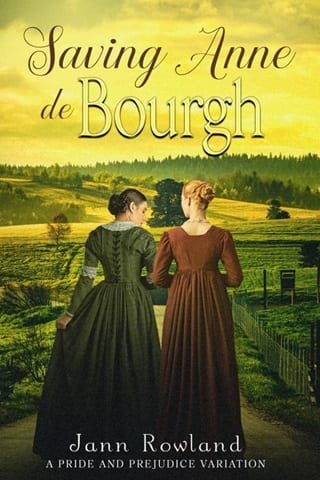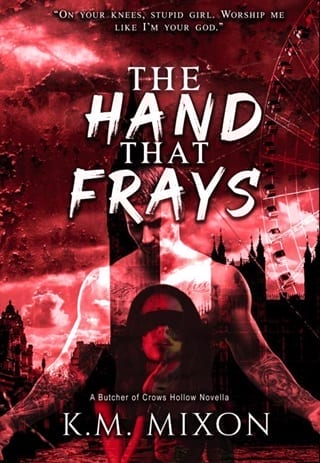Chapter XXVII
M r. Bennet calling Elizabeth into his study was not an unusual occurrence. Father and daughter were close, often sharing a morning discussing their recent reading, or Mr. Bennet relating some matter of the estate that troubled him. Since the last time Elizabeth had approached him when she had argued against Lydia going to Brighton, she had spent little time in her father's room. Yet she knew it was open to her whenever she wished, a privilege not so readily available to her sisters.
Thus, Elizabeth was not at a loss for the reason Mr. Bennet might wish to speak to her. If her suspicions were correct, her mother had approached her father, and he wanted her advice. Her father, however, proved more insightful than Elizabeth had expected.
"Did you know your mother approached me last night?" asked Mr. Bennet.
"I will own that I had some notion of it," replied Elizabeth.
"And do you know of what she wished to speak?"
"Given her annoyance at Kitty and Lydia last night, I suppose it was something about the girls," ventured Elizabeth.
Mr. Bennet regarded her, introspective and perhaps even a little speculative. "Then allow me to explain what happened. I was enjoying a good book yesterday evening when your mother invaded my study."
After a momentary pause, Mr. Bennet chuckled to himself. "That was also a surprise, for your mother rarely remembers to knock, and when she does it sounds like an earthquake. Last night, however, I almost thought you were outside my door rather than your mother."
"What did she want?"
"At first, I paid little attention to her. Your mother so often has a bee in her bonnet that it is easier to allow her to have her head when she is excited; she rarely requires a response when she is in such a state.
"Yet last night she came into my room, complaining about the behavior of our youngest daughters, certain they would ruin us all and render it impossible for her eldest daughters to marry. Not only did Jane, who has that puppy Bingley sniffing around her, figure prominently in her diatribe, but it surprised me to hear the names ‘Mr. Darcy' and ‘Lizzy' pass her lips together, apparently in relation to each other. Is there something of which you have not been telling me, Lizzy?"
It was hard, but Elizabeth held the blush from staining her cheeks—or she thought she did, for she remained calm. Mr. Bennet seemed to sense something of her mortification, for the chuckles in which he had been indulging since she entered his room returned.
"It was not as if I did not notice something of Darcy's interest in you, of course," said he, his tone completely offhand. "The gentleman has proven himself to be an excellent sort, and I am not so old that I do not recall the look of a man besotted with a woman. But your mother, for all her powers of perception for any men showing even a hint of interest in her daughters, remained stubbornly obtuse until last night."
Mr. Bennet shrugged and added: "That is all interesting, of course, but hardly germane to the subject at hand. After she ranted at some length about your sisters, your mother made a most surprising demand."
"And that was?" asked Elizabeth, curious to hear what conclusions her mother drew.
"Why, she wants to hire a companion."
"That is . . . interesting," said Elizabeth.
It was, she supposed, the most likely outcome of what Lady Catherine had said. After the lady had informed them all that families in fashionable circles did not send their daughters to finishing school, no matter what Miss Bingley claimed, Mrs. Bennet would not suggest that for her daughters. It only made sense that she would latch onto Lady Catherine's suggestion for a companion to see to their education. The question was what her father thought about such a notion.
"‘Interesting' is all you can say?" said Mr. Bennet, appearing to be enjoying himself. "Tell me, Lizzy—did you have anything to do with your mother's sudden change of heart?"
"You suspect me?" asked Elizabeth, discomposed that he had come to that conclusion so quickly.
Mr. Bennet regarded her evenly. "Allow me to state my perspective, Lizzy. You appear to be friendly with at least one of the Netherfield ladies—no one in Meryton is close to the Bingley sisters—and you esteem Colonel Fitzwilliam and, curiously, Mr. Darcy. Knowing how long you deplored your younger sisters' behavior I suspect you concocted it to open your mother's eyes to the truth of her youngest. Is my guess near the mark, or is there something else I do not know?"
It appeared there was little point in further obfuscation, and Elizabeth was concerned denying it would affect her father's decision. "I was concerned, Papa. More to the point, Mr. Bingley and Mr. Darcy are also concerned, to say nothing of Lady Catherine."
"Then you confess the gentleman is interested in you?"
"Do I need to? Did you not see it for yourself?"
"I did," chuckled her father, "but a little confirmation of your feelings is always welcome. Might I ask how this all came about?"
"I spoke with Mr. Darcy," said Elizabeth with a shrug. "Mr. Darcy spoke to Anne and Colonel Fitzwilliam, and between them, they planned how to do it."
"What of Lady Catherine?"
"Can you imagine making such an application to her?"
This time Mr. Bennet's response was a laugh. "No, I suppose not."
"It was not required, regardless," said Elizabeth. "At Rosings, Lady Catherine learned that I never had a governess, that we were all left to acquire whatever education we wished. She was horrified by the notion."
Mr. Bennet frowned. "That is not entirely accurate, Lizzy."
"It is not," replied she. "Yet that was how Lady Catherine saw it, and there is some truth regarding Kitty and Lydia."
With a snort, Mr. Bennet said: "It is only because you were so much trouble that you wore your parents down with your inability to apply yourself."
"Yet I believe I am the best educated of my sisters," replied Elizabeth, a little primly.
"That you are," said Mr. Bennet. "It is a testament to how much you settled when you outgrew your early childhood.
"With that in mind, I suppose all you did was direct Lady Catherine to the correct subject and let her pontificate to her heart's content?"
"Yes, that is a fair approximation of what happened," conceded Elizabeth.
"Then it was no less than inspired," said Mr. Bennet.
Elizabeth was grateful her father had not taken offense. He appeared rather amused at the business, not unexpected given his character. The only question was what he thought of the notion and whether they could afford it. When Elizabeth asked him, he sat back and considered her.
"As you know, when I tally our yearly expenses, there is not much left for such things as paying a companion to educate your sisters. Thus, we must economize if we are to do this."
"Do you suppose Mama will agree?"
"She must," replied her father with a shrug. "If she does not, there is no money in our budget for this expense.
"For the record," continued Mr. Bennet, "I agree with Lady Catherine's assessment. You would not know, as I do not speak of it, but when I was a young man and before I married your mother, I had some experience in London society."
Interested, Elizabeth regarded him. "No, I do not recall you speaking of this."
"That is because it is not of much consequence," shrugged Mr. Bennet. "My experiences form the basis for my opinion of society; as we do not possess the means to swim in those waters, it makes little difference if I disdain London."
"Is there a particular event of which you speak?" asked Elizabeth, suspecting he had not told her all.
Mr. Bennet chuckled and regarded her with open affection. "That is my Lizzy—always perceptive. Yes, Elizabeth, there was a particular event that soured me to all things London."
Leaning back in his chair, Mr. Bennet grew introspective. "In university, I had several acquaintances among the higher set—a few of them were excellent friends. I keep in touch with one or two, though I have not seen them in many years."
Mr. Bennet gestured to a chessboard that sat in the corner, carefully away from any activity in the room. There was always an active game on the board, and since Elizabeth had been old enough to understand the game, she knew her father played over the post with acquaintances. Kitty, becoming too rambunctious, had once knocked the board over, earning her father's annoyance. Now it was common knowledge in the house that the board was to be left strictly alone, and her father kept a paper that described the layout of the pieces that he updated frequently.
"What you do not know is that game," said Mr. Bennet, "is one I play through correspondence with an earl, a man I have known for many years." Mr. Bennet chuckled and added: "We are evenly matched, for he holds an advantage over me by one game. I am hopeful I shall equal him this time."
"An earl?" asked Elizabeth, wide-eyed. "I had not thought you had such acquaintances."
"A pair of earls, three barons, and a baronet," said Mr. Bennet with an indifferent shrug. "The man with whom I play this game is my close friend—the others I correspond with occasionally or not at all, and one man has died."
Elizabeth regarded him with suspicion, leading her father to laugh. "Do not suppose I hold some dark secret, such as my friend being Mr. Darcy's uncle or some such nonsense. That would be a coincidence, indeed. No, my friend is the Earl of Abingdon, who is an excellent sort, though, like all the peerage, he is full of himself."
"I would invite you to say such a thing to Mr. Darcy or Colonel Fitzwilliam," said Elizabeth.
"Perhaps I should!" exclaimed Mr. Bennet. "If I did, the colonel, at least, would agree with me!"
"Yes, you may be correct," said Elizabeth. The colonel was a jovial man who enjoyed a good joke—there was every possibility that he would find such talk amusing. "You were speaking of your experience in high society."
"I was," agreed Mr. Bennet. "As the Earl of Abingdon—he was a viscount then—was a good friend, he invited me to attend the season with him the year we graduated from Cambridge. I will own we had some notion of cutting a swath through the young ladies of London."
"Did you?" asked Elizabeth.
Mr. Bennet regarded her with a grin. "I will not suggest that I attracted as much attention as my friend. He is an earl, after all, and at that time was a most eligible viscount. We were not ready for marriage, of course, for we were but two and twenty. Yet we were eager to partake in the delights of the season and break the hearts of as many young ladies as we could.
"My friendship with Abingdon was, I must suppose, something of an attraction to a young lady of a certain level. These ladies were not possessed of the lineage or dowry of a woman from a noble family, but by the standards of this neighborhood, they were wealthy ladies, indeed. There was one in particular that I liked very well."
"You said you were not interested in marriage," observed Elizabeth.
"So I did," agreed Mr. Bennet. "Yet the face of a pretty young woman may overcome such scruples. In some respects, I consider young Bingley unready for a wife, and I was about his age. Regardless, I soon became enamored of this young woman."
"Then what happened?" asked Elizabeth.
"Abingdon's sister, who was a good sort of woman herself, heard some gossip. At her brother's urging, she told me of what she had heard. The woman, though pretty and engaging, had several character flaws of which I was not aware. Among them was a desire to ascend to the heights of society, not unlike Miss Bingley.
"When I heard her account, I was tempted to ignore it. She convinced me enough that I watched carefully to see if I could discern any of the tendencies of which she had informed me. When I had seen enough, I confronted her."
"She was false?"
"More that she wished to use me to get to Abingdon. The details are unimportant, but she had an earl in her sights, but nowhere near enough standing to be a serious prospect for him. She planned to put herself close to me, then use the connection to create an opportunity to compromise my friend."
Mr. Bennet shrugged. "As you might suspect that event opened my eyes to the truth of society. While there are assuredly good people among them, most of London consists of fortune hunters on the prowl to improve their positions, degenerates who care for nothing but their vices, or those determined to look down on others who do not meet their ideas of quality."
"Then your aversion for society dates from that time," said Elizabeth.
"My interest in society has always been limited," said Mr. Bennet. "In my youth, I was a little more willing to mingle. Soon after I returned to Longbourn, my father passed away, leaving me with the estate. After my mourning, my friend again invited me to attend the season, but I had already had more than my fill. I declined and have not returned since."
Elizabeth nodded, the account surprising her. She did not think even her mother had heard so much as a whisper of this.
"Then you stayed in Meryton and married Mama."
"Yes, well," said Mr. Bennet, mirth infused in his tone, "that was not one of my more intelligent decisions."
"Papa!" cried Elizabeth, scandalized he would say this much of her mother.
"Do not concern yourself, Lizzy," said he, waving away her offense. "I am fond of your mother, for all that her nerves are the bane of my existence. She has made me a creditable enough wife, though she is not much of a companion. Then again, I am no companion to her, so in that, I suppose, we are equal. We are not unhappy together, despite outward appearances."
Despite Elizabeth's frequent exasperation with her mother's ways, she was not comfortable with her father's characterization of his spouse. It was better to leave such subjects strictly alone, so she turned the conversation back to the original subject.
"As I recall, we were speaking of budgeting for a companion."
"We were, though I believe we had moved past that subject. If your mother wants her daughters taught by a companion, she must economize—there is nothing else to be done. There is another matter to consider, one that may improve our financial position."
"Oh?" asked Elizabeth, noting the mischievous gleam in his eye. "And what might that be?"
"Why, only that there are two wealthy and eligible men sniffing about my eldest daughters," said Mr. Bennet. "Should these men take them off my hands, there will be plenty of funds in the budget to afford a companion.
"Then again," mused Mr. Bennet with a twinkle in his eye, "that will only be possible if your mother does not pauper me in the process of planning the weddings."
"Yes, I suppose that is a consideration," said Elizabeth, refusing to rise to his jest. "In the one, I will say the possibility is strong. The second, however, is fraught with uncertainty."
Any hint of mirth ran away from her father's face, and he regarded her with all the seriousness in his command. "While I would never insult your intelligence by suggesting you do not know what you want in life, I would counsel you not to dismiss this Mr. Darcy without careful consideration."
"Are you now turning into a matchmaker, Father?" asked Elizabeth, arching a brow at him.
"Hardly," snorted Mr. Bennet at the notion. "Darcy's obvious wealth does not move me as it does not convince you, and I understand he did not present himself to best advantage. Since he has returned, however, he has shown a completely different side of his character."
"This I understand, Papa," said Elizabeth with a sigh. "You know my wishes. I cannot say whether Mr. Darcy fills them."
"No, I do not suppose you can." Reaching forward, her father took one of her hands and held it in his, an affectionate gesture he rarely offered. "I neither suggest you accept him should he propose, nor do I advise you to throw caution to the wind. What I will suggest is that you take your time and learn about the man hiding behind the mask he shows to the world. Your lively temperament would put you at a great disadvantage in an unequal marriage, Lizzy— that is the true reason I supported you when you refused my cousin."
"I thought it was because I did not wish it," said Elizabeth.
"That was part of it," confessed Mr. Bennet. "But not all. No, I would not force you to marry where you do not wish. If, however, the man you refused would be good for you, I would at least rouse myself to speak to you and advise you to reconsider.
"Mr. Darcy is a different sort of man from my foolish cousin. Should you allow him to worm his way into your heart, I suspect he might be the making of you, and you of him. He is the sort of man that commands respect; the question is, does he respect you?"
Later, when Elizabeth considered her father's words in the privacy of her room, she acknowledged his perception. He knew her as well as anyone, better, in fact, than Jane, whose disposition was far too sunny to consider such matters as her father had discussed with her. For Jane, love was all she ever wished—it would be enough for her. Mr. Bennet, however, had raised the specter of another important aspect of choosing one's partner: the desirability of having a spouse's respect.
It was a significant reason that her mother and father were often at odds. Mr. Bennet, quite simply, did not respect his partner, or at least he did not respect her capabilities. Mrs. Bennet's sentiment on the matter was not nearly as clear. Elizabeth thought her mother respected her father's authority, but as for the rest, it was difficult to say. Perhaps matters were improving between them, though they would never be the close companions she wished to find in a husband.
The question her father had posed at the end of his explanation stayed with Elizabeth for the rest of the day. Did Mr. Darcy respect her? In some ways, she knew he did, for he had spoken of the facets of her character he appreciated and spoke to her as an equal. Should Elizabeth marry him, she would have a companion with whom to speak, a man she could respect as capable, even admirable. She could not say the same had she accepted Mr. Collins.
In some ways, however, she could do nothing other than conclude Mr. Darcy did not respect her, though, with the recent changes in the gentleman's manner, it was perhaps more correct to say that he had not respected her. By his own admission, he had approached her at the parsonage, confident that no woman could reject his proposal. His way of expressing himself, his resentment when she had refused all suggested that he respected her only in what she represented to him, a woman to whom he felt attraction, and—Elizabeth could now acknowledge—for whom he felt some measure of love. It was not her purpose to malign his feelings, but Elizabeth was convinced he had not been so deeply in love with her as he had supposed.
The more pertinent question was what he saw when he looked at her now. That was the question Elizabeth could not answer at present. The gentleman had spoken of his increased devotion to her, and his actions appeared to prove his assertion, at least to a certain extent. What man, for example, approached a woman again when she had so soundly rejected him the first time? Not a man so prideful as Elizabeth had supposed Mr. Darcy to be.
Could a man change his ways, move past his character flaws, and strive to be something better? Faults would always remain, for no one could achieve perfection in this life, but surely one could better themselves, and improve those defects that plagued them. Elizabeth hoped for just such an end for her younger sisters with the companion that Mr. Bennet meant to hire. Surely Mr. Darcy could do the same.
This was the most important decision of her life, for a lifetime would be a long time to endure should she choose awry. Though she considered it to excess that morning, she came to only one conclusion. There was no choice but to meet Mr. Darcy with her heart open to the possibility of his claiming it. Her father's advice had been excellent, for there was little else she could do. If Mr. Darcy did not excite the feelings in her that she wished, and if she understood he did not respect her, it would be better if she let him know gently and allowed him to go his own way. She would do them both a favor in such circumstances.
If, however, he showed himself to be her perfect match, she would be a fool to allow him to escape. Jane had already found all for which she had ever dreamed, and Elizabeth had confidence her sister would be happy with Mr. Bingley. A union with the man's close friend would keep Elizabeth forever close to her dearest sister, another factor to consider. That Mr. Darcy and Mr. Bingley's close friendship was a potential inhibiting element should Elizabeth decide against Mr. Darcy was not lost on her. Yet she could not allow that to affect her judgment.
 Fullepub
Fullepub 



